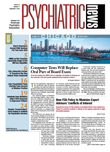The oral examination component of the certification exam for general psychiatry and child and adolescent psychiatry will be eliminated and replaced by an entirely computer-based exam using vignettes to test candidates' clinical judgment and reasoning.
The American Board of Psychiatry and Neurology (ABPN), which administers the certification examinations, has not yet determined a specific timetable for eliminating the oral exam. However, the ABPN's executive vice president and chief executive officer, Larry Faulkner, M.D., told Psychiatric News that a timetable for conversion to a computer-based format will be determined at the board's fall meeting.
“We will look at our options, but we want to get the timeline out as soon as we can,” he said. “We will have a better idea in the fall how many years it will take to put together a computerized exam.”
The elimination of the oral exam, also known as Part II of the examination process, follows an earlier decision to phase out the live patient interview. Most current residents, however, will continue to take the exam that is designated for them in existing ABPN policies.
Psychiatry residents who started their PGY-1 before July 2007 or PGY-2 before July 2008 will still have to take an oral exam consisting of a one-hour patient interview and one hour of patient vignettes—in either written form or on video—followed by questioning by an examiner. The content of the exam for residents who started PGY-1 in July 2007 or PGY-2 in July 2008 will be determined this fall, Faulkner said.
“It will take a number of years for us to wind down the oral examination,” Faulkner said. “We will still be giving the oral exam well into the next decade.”
The decision to eliminate the oral examination has been a long time coming. In an interview with Psychiatric News two years ago, when Faulkner assumed leadership of ABPN, he predicted that the psychiatry exam would in time be fully computerized; neurology has already eliminated the oral component from its certification exam, as have many other specialties.
The cost of taking the oral exam is expensive (the fee for the 2008 exam was listed on the ABPN Web site as $1,350), and candidates bear the cost of travel to the exam site and associated expenses. Moreover, the oral exam has proven difficult for candidates and is linked to a low pass rate for psychiatry compared with pass rates of other specialties.
In the earlier Psychiatric News interview, Faulkner said that the relatively low pass rate may be explained by cultural or language barriers.“ But we suspect that a predominant reason is the crippling effect of anxiety,” he said.
ABPN President Burton Reifler, M.D., told Psychiatric News that technology available has made a computerized approach, which would be less expensive, more feasible.
“At our meeting this summer, we asked ourselves, 'What are we trying to accomplish with the oral exam?'” he said. “We agreed that what we want to test is clinical judgment and reasoning. But if we could test clinical judgment and reasoning using a computer-based exam, was there any reason to continue with the oral examination? We are now in the process of studying the technology for testing clinical judgment in a computer-based format.”
Reifler is a professor of psychiatry at Wake Forest University School of Medicine.
The move is also part of an effort to ensure that “core competencies,” determined by the Accreditation Council on Graduate Medical Education, are tested during residency. Some of those competencies—the ability to examine a patient, establish and maintain a relationship with the patient, and present a case—are assessed in the oral exam.
Now, residency training directors are required to ensure that trainees demonstrate achievement of those competencies before leaving residency and to initiate remediation training for those who fail, Reifler said.
Faulkner and Reifler acknowledged that the oral examination has a long tradition in psychiatry. “There is something to be said for looking across the table at a young colleague and making an assessment to see if [he or she has] achieved adequate competence,” Faulkner said. “Most of the [ABPN] directors can see both sides of this argument. It's just that over time, on balance after due consideration, we feel the advantages of a computer-based exam outweigh the advantages of an oral exam.
“This is a decision the board has labored over for a number of years and we recognize that this is a significant change in the culture of our exam.” ▪
